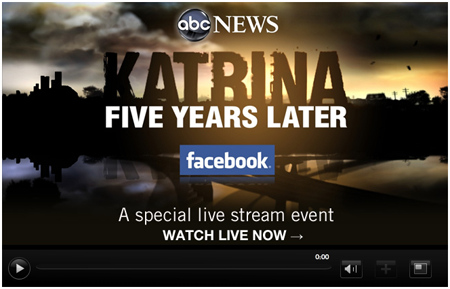
If you go to the ABCNews.com homepage right now (12:30 p.m. EDT), you’ll see something unusual: the news network’s coverage of the five-year anniversary of Hurricane Katrina, streamed exclusively online — in real time. The coverage includes a couple of pre-produced pieces, but for the most part it’s live: ABC correspondents David Muir, Robin Roberts, and Bob Woodruff, on the ground in New Orleans, talking with residents, interviewing former mayor Ray Nagin, and otherwise employing shoe leather in the service of memory.
But the network’s coverage will be participatory and conversational in a way that TV news often tries, but fails, to be: ABC is using Facebook Connect to stream its Katrina coverage to its website. As a result, for the next half hour, “you’re going to be to see people liking it and commenting on it in real time,” says Brian Braiker, part of ABCNews.com’s social media team.
It’s not often, leaving aside CNN’s Facebook-hosted stream of the Obama inauguration (and Rick Sanchez‘s “Latest from Twitter” shout-outs) that networks’ televised content and their online interfaces merge so explicitly. And ABCNews’s foray into the field of platform integration is very much an experiment at this point. “This is sort of like a trial run for the elections,” Braiker says. “We’re going to go really big for that…whatever wrinkles there are obviously will be smoothed out before the election.”
That doesn’t mean the experiment is casual. ABCNews’ Facebook partnership “is all part of a broader, more detailed and in-depth social media strategy,” Braiker notes, “in how best to tell stories through all these emerging media.” Today “is the first salvo in an ongoing experimentation with a lot of this new and social media stuff that we want to integrate as much as we can into our coverage — and make it different and better than everyone else’s.”